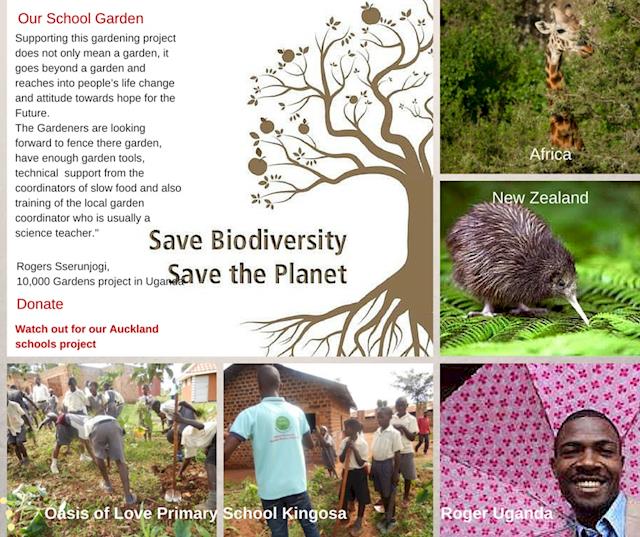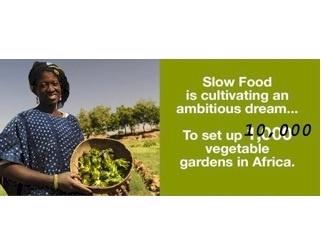Slow Food Waitakere Garden in Africa
This project has reached its target. You may still donate to this project if you wish.
SLOW FOOD AFRICA. Cultivating the future and food security with 10,000 food gardens. Help us adopt and support our African food garden.
Auckland
Slow Food envisions a world in which all people can access and enjoy food that is good for them, good for those who grow it and good for the planet. Good, clean, fair food.
SLOW FOOD AFRICA
Cultivating the future with 10,000 food gardens
Slow Food is creating a network of young people working to save Africa's extraordinary biodiversity, to raise the profile of traditional knowledge and food culture and to promote small-scale, family farming.
Creating 10,000 good, clean and fair food gardens in African schools and villages means guaranteeing communities have a supply of fresh, healthy food, but also training a network of leaders aware of the value of their land and their culture who can serve as protagonists for change and the continent's future.
The 10,000 food gardens are the concrete tool for making this dream a reality.
A Slow Food Garden is a Diverse Garden
Slow Food is not simply creating a series of gardens in Africa, it is also promoting an idea of agriculture based on knowledge of the terrain, and respect for biodiversity and local cultures: An agriculture that is capable of feeding African communities without distorting social relations and destroying the environment, while also respecting the dignity of communities (their history and knowledge).
In the Slow Food gardens, fruits, vegetables, aromatic herbs and medicinal plants are grown. Seedbeds are created to produce seeds, so they do not need to be purchased every year. Compost is made with discarded vegetables, manure and ash, to avoid damaging the land with chemical fertilizers. The plants are protected using traditional methods, such as nettles, to avoid buying pesticides, which poison the soil and water. Water is saved by collecting rainwater, preserving the moisture in the soil through mulching and making use of drip irrigation systems. The harvest supplies families and school canteens (in the case of school gardens), with the excess produce being sold at local markets or in small restaurants that sometimes develop next to the gardens.
The cost of adopting one of the African garden projects is 900 euro. This covers the purchase of materials, training for a local team and on-site project coordination, distribution of educational materials and organizing opportunities for exchange among projects. It also includes a contribution towards scholarships for African students to study at the University of Gastronomic Sciences in Italy
Slow Food Waitakere's involvement (page creator)
Why are we adopting a food Garden in Africa?
In October 2014 Fi and Anutosh from Slow Food Waitakere travelled to Turin in Italy to participate in Salon Gusto/ Terra Madre - Slow Food's biennial conference. It was a life changing experience
Our goal was to connect with and understand the big vision and mission of Slow Food and how we can bring it to life in Aotearoa/New Zealand. ( ... while acknowledging our group are already doing some great stuff.)
Biodiversity took centre stage and Slow Food is taking action. And action is needed right now with "man made mass extinctions" threatening our food supply, food sovereignty and our food and cultural traditions.
So we have come back ready for action.
Ready to launch some great projects and to work with our members and supporters to make them happen.
Ready to reach out to the world and to do the work in our own backyard.
About us
Promotes taste education and sustainability.
Defends biodiversity.
Supports local growers and food artisans.
Slow Food is a global, grassroots organization, founded in 1989 to prevent the disappearance of local food cultures and traditions, counteract the rise of fast life and combat people’s dwindling interest in the food they eat, where it comes from and how our food choices affect the world around us.
Since its beginnings, Slow Food has grown into a global movement involving millions of people, in over 150 countries, working to ensure everyone has access to good, clean and fair food.
Slow Food believes food is tied to many other aspects of life, including culture, politics, agriculture and the environment. Through our food choices we can collectively influence how food is cultivated, produced and distributed, and as a result bring about great change.
Latest update

Cool words from Uganda 20 March 2015
Check out the poster I made to share what Roger has to say about Slow Food's gardens in Uganda (btw Canva is a good app but still grrrr.....). We are on track to sponsor our Slow Food Waitakere School Garden in Africa next month and you can still donate. Thanks to everyone who has supported us so far. And we have also started our Auckland schools' project (still secret squirrel but not for long)
Latest donations

So thrilled to have reached our target

Thank you for your generousity and vision.

Thank you for your vision and support - it's a very exciting project.
Who's involved?
Our other pages
Page Q&A
Ask a question hereAny concerns?
Report this pageThank the donor
Your message will be displayed on the page and emailed to the donor.
Your new message will also be emailed to the donor.
Saving a blank entry will delete the current comment.


